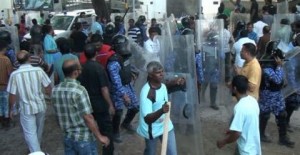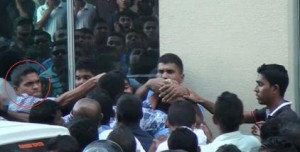Minister of Finance and Treasury Abdulla Jihad yesterday announced the government’s intention to revise the changes made to import duties and to reduce the Goods and Services Tax (GST), after arguing that these policies had failed to improve the state’s finances.
The measures, introduced under the previous government, followed consultations with the International Monetary Fund (IMF) over how to strengthen and stabilise the economy.
These policies included introducing a general Goods and Services Tax (GST); raising import duties on pork, tobacco, alcohol and plastic products; raising the Tourism Goods and Services Tax (T-GST) to 6 percent; and reducing import duties on certain products.
The shortfall from reduced import duties was expected to be more than compensated for by Rf 2 billion (US$129.8million) in Tourism Goods and Services Tax (T-GST), effective since February 2011, and Rf1 billion ($US64.9 million) as general Goods and Services Tax (GST), introduced in August 2011.
Jihad yesterday explained that it was the failure of these taxes to cover lost import duties that prompted a revision of these policies.
“There hasn’t been an increase in State revenue by increasing GST after reducing duties. The GST had been increased from this year to cover the cut down on duty rates. But GST revenue does not even come close to covering it,” Jihad told Haveeru.
Amendments to the Export-Import Act were passed in the Majlis in November last year. The amendments eliminated import duties for items such as construction material, foodstuffs, agricultural equipment, medical devices, passenger vessels and goods used for tourism services.
Duties were raises for tobacco, whilst the motion to increase pork and alcohol duties – items considered haraam under Islam and therefore consumed only on the resort islands – was defeated.
T-GST, as well as GST, was raised to 6 percent in January this year. The IMF has more recently urged that T-GST be raised to 12 percent in order to expedite the government’s deficit reduction efforts.
Jihad is reported as having told Haveeru that the government will also look to increase T-GST as it works to reduce a budget deficit that is anticipated to reach 27 percent of GDP this year – Rf9.1billion (US$590million).
Last month Jihad told Minivan News that the government was seeking to reduce all non-wage expenditure by 15 percent. He also explained that a pay review board was to be convened in order to “harmonise” the pay of all government employees, although he was keen to add that wage cuts would only be considered as a last resort.
“It doesn’t make sense”
Haveeru yesterday reported that around Rf1 billion (US$64.9 million) had been lost after the reduction in import duties.
Former Finance Minister Ahmed Inaz, who presided over the previous government’s economic reforms, said that this figure was inaccurate. He argued that the import duties lost amounted to a figure closer to Rf500million (US$32.5million).
Inaz also pointed out that Jihad’s proposed policy revision went against the Maldives’ previous commitments to free trade.
“We are founding members of the World Trade Organisation (WTO) and members of the South Asian Free Trade Area (SAFTA). We should be increasing trade – tariffs are not the best way to do this,” said Inaz.
“GST is a more transparent system [than import duties] which also enhances opportunities for the business sector,” he added.
GST benefits companies with less initial capital as products are taxed at the point of sale rather than up front upon entry to the country.
Jihad’s assertions that the previous government’s economic reforms are failing appear not to be borne out by the Maldives Inland Revenue Authority (MIRA) figures, the most recent of which show that the state has received Rf 418 million (US$27.1million) and Rf 789 million (US$51.2million) in GST and TGST respectively, over the first five months of this year.
Should this revenue stream continue on a similar path, the government can be expected to receive around Rf 2.9 billion (US$188.3million) from GST and TGST. The government income from import duties over the past five years has been just over Rf 2 billion (US$129.8million).
Jihad was not responding at time of press.
Former Minister for Economic Development Mahmood Razee believed that the government was “trying to confuse the issue”.
“They are trying to create the illusion that this is the case but the calculations were confirmed and passed through the Majlis,” he said.
Failing a large reduction in the amount of goods coming into the country, Razee continued, these calculations should still be valid. He added that he had been unable to get specific details on such figures from customs.
Both Razee and Inaz were confused as to the merit of the seemingly contradictory measures of increasing import duties whilst reducing GST.
Speaking to Minivan News separately, both said: “It doesn’t make sense.”
Inaz last night Tweeted: “Rationalising state expenditure and increasing revenue from tax is the only way forward”.
“We need political agreement to reduce expenditure in order to achieve maintainable economic stability,” he told Minivan News today.




